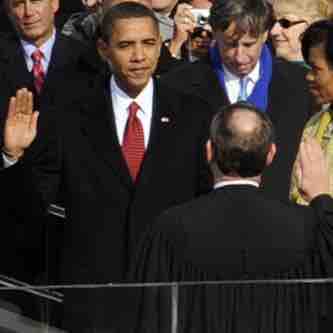Introduction
The President of the United States of America is the head of state and head of government of the United States. The president leads the executive branch of the federal government and is the commander-in-chief of the United States Armed Forces. Since the founding of the United States, the power of the president and the federal government have grown substantially, and each modern president, despite possessing no formal legislative powers beyond signing or vetoing congressionally passed bills, is largely responsible for dictating the legislative agenda of his party and the foreign and domestic policy of the United States .

Obama Taking Oath of Office
After winning the 2008 presidential election, Barack Obama was sworn into office on January 20, 2009.
As Legislative Facilitator
The Constitution's Ineligibility Clause prevents the president from simultaneously being a member of Congress. Therefore, the president cannot directly introduce legislative proposals for consideration in Congress. However, the president can take an indirect role in shaping legislation, especially if the president's political party has a majority in one or both houses of Congress. For example, the president or other officials of the executive branch may draft legislation and then ask senators or representatives to introduce these drafts into Congress. The president can further influence the legislative branch through constitutionally mandated, periodic reports to Congress. These reports may be either written or oral, but today are given as the State of the Union Address, which often outlines the president's legislative proposals for the coming year.
Campaigns and Nomination
The modern presidential campaign begins before the primary elections, which the two major political parties use to clear the field of candidates before their national nominating conventions, where the most successful candidate is made the party's nominee for president. Typically, the party's presidential candidate chooses a vice presidential nominee, and this choice is rubber stamped by the convention. Nominees participate in nationally televised debates, and while the debates are usually restricted to the Democratic and Republican nominees, third party candidates may be invited, such as Ross Perot in the 1992 debates. Nominees campaign across the country to explain their views, convince voters, and solicit contributions. Much of the modern electoral process is concerned with winning swing states through frequent visits and mass media advertising drives.